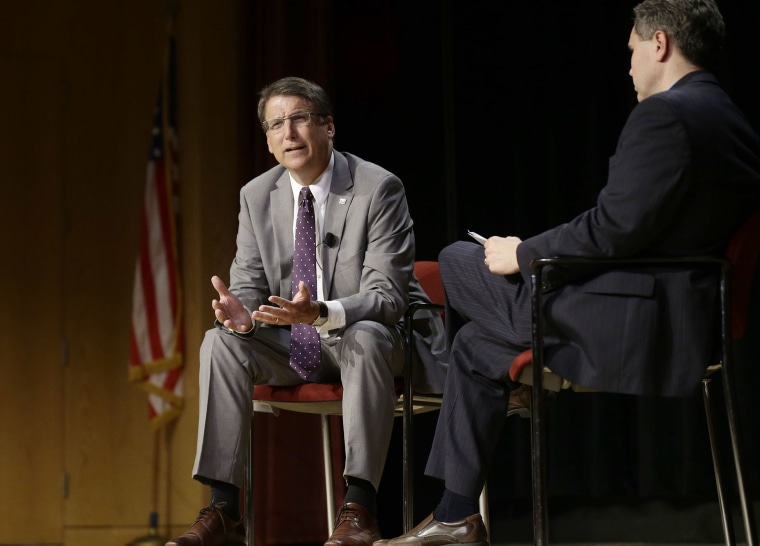Republicans were generally pleased with this year's gubernatorial elections, flipping several seats from "blue" to "red," extending the GOP's national advantage in gubernatorial offices. There is, however, one glaring exception.In North Carolina, Gov. Pat McCrory (R) had a tumultuous first term, faced a top-tier opponent in state Attorney General Roy Cooper (D), and appears to have lost a close race. As
WRAL reported overnight, counties are continuing to count provisional ballots, but at this point, "Cooper's lead has grown from fewer than 5,000 on Election Night to more than 6,600 by Monday evening." McCrory's team has filed a series of challenges to vote tallies, but those filings have been largely "dismissed by Republican-controlled county elections boards as either factually incorrect or unproven."And in theory, there's not much more to talk about. Cooper has declared victory; McCrory is under pressure to honor the will of voters; and state officials are moving forward with plans for a gubernatorial inauguration in early January. But in practice, as the
New York Times explained the other day, the prospect of a political crisis is a little too real.
The legal and political jockeying raised the specter of a recount, and it could ultimately climax in a political wild card: Mr. McCrory using a state law to contest the election in the state's Republican-dominated General Assembly. [...][T]he immediate question in North Carolina is how long Mr. McCrory will dispute the results and whether he might ultimately ask the General Assembly to consider the election. Under state law, the legislature could order a new election or, "if it can determine which candidate received the highest number of votes," it may declare a winner. The law asserts that the legislature's decision in such a contest is "not reviewable" by the courts.
Some of you may have read that and thought, "Wait, that can't be right." But I'm afraid it is.According to McCrory and his allies, North Carolina's voting was marred by fraud. Note, most North Carolinians backed Donald Trump and Sen. Richard Burr (R) on the same ballot, but the Republican governor insists fraudulent votes cost him a victory.McCrory doesn't seem to have any credible proof to substantiate the claims, but the governor nevertheless seems eager to de-legitimize the election he appears to have lost.But this isn't just an example of a sore loser handling defeat badly. McCrory seems to realize he's going to end up with fewer votes than Cooper, but as
Slate's Mark Joseph Stern
explained yesterday, the Republican is looking ahead, trying to delay the formal declaration of a winner "in order to let the Republican-dominated legislature ignore the true result and re-install McCrory as governor for another four years."
North Carolina state law states that when "a contest arises out of the general election," and that contest pertains "to the conduct or results of the election," the legislature "shall determine which candidate received the highest number of votes" and "declare that candidate to be elected." By alleging fraud, mishandling of ballots, and irregular vote-counting, McCrory is laying the groundwork for the legislature to proclaim that a "contest" has arisen as to "the conduct or results of the election." At that point, it can step in, assert that McCrory received "the highest number" of legitimate votes, and "declare [him] to be elected."The best part? Under the law, the legislature's decision is "not reviewable" by the courts. Republican legislators can simply step in, overturn the decision of the voters, and grant McCrory another term. The courts have no authority even to review the legality of their actions.
That would, of course, create a serious political crisis, especially given the fact that McCrory and his allies have no credible proof of widespread fraud.To be sure, it's not yet clear if GOP officials in the state intend to pursue such a course, but the possibility of such a Republican gambit remains quite real. Watch this space.Update: Reader M.L. flagged
this Charlotte Observer piece, which challenges some of the conclusions drawn by the
New York Times and
Slate:As for whether such a decision now could be reviewed by courts, here’s what that 2005 N.C. statute actually says: “The decision of the General Assembly in determining the contest of the election pursuant to this section may not be reviewed by the General Court of Justice.” According to the state’s Administrative Office of the Courts, the “General Court of Justice” is the entire N.C. court system, which includes Appellate, Superior and District courts.While that might mean that N.C. courts can’t question such a decision, federal courts definitely can. So says Richard Hasen, election law expert and professor at the University of California-Irvine.
